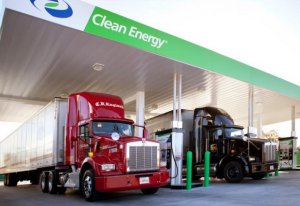 As the NGVAmerica North American NGV Conference and Expo starts up today in Kansas City, Mo., one issue is inevitably going to be mentioned by speakers and at luncheon tables. The California Air Resources Board (CARB) just-released proposed changes to adopting the state’s Low Carbon Fuel Standard would give natural gas vehicles lower clean fuel ratings as a means to reduce greenhouse gas emissions. That would likely mean less funds will be available for grants, incentives, and through participation in California’s cap-and-trade credit market.
As the NGVAmerica North American NGV Conference and Expo starts up today in Kansas City, Mo., one issue is inevitably going to be mentioned by speakers and at luncheon tables. The California Air Resources Board (CARB) just-released proposed changes to adopting the state’s Low Carbon Fuel Standard would give natural gas vehicles lower clean fuel ratings as a means to reduce greenhouse gas emissions. That would likely mean less funds will be available for grants, incentives, and through participation in California’s cap-and-trade credit market.
NGVAmerica is challenging CARB to refrain from adopting its proposed GREET 2.0 model that puts natural gas lower on the scale due to emissions of unburned methane escaping from a natural gas vehicle’s tailpipe. “We respectfully urge CARB to refrain from making changes in the California GREET model at this time,” NGVAmerica’s Jeffrey Clarke, director of regulatory affairs and general counsel, wrote in a letter to CARB. Similar letters have been filed by Clean Energy Fuels Corp, Westport Innovations, the California NGV Coalition, Southern California Gas Co., and others. They’re making the point that the methodology CARB used in its proposed policy drew from obsolete data; and it was released in October with only nine days to respond.
The Low Carbon Fuel Standard and the cap-and-trade market came from the passage of AB 32 in California with targets to reduce greenhouse gases to 1990 levels by 2020. Credits being traded by oil companies, refineries, utilities, and other carbon producers through cap-and-trade have brought more funds to the state with a sizable chunk of it now being available for clean transportation projects. There will be an important meeting by CARB coming up in February on adopting changes to the Low Carbon Fuel Standard that will affect the future of natural gas vehicles in the state.
Renewable natural gas (such as Clean Energy Fuel Corp.’s Redeem fuel) has made financial gains through California’s carbon credits. Whether biomethane will be included in CARB’s natural gas vehicle cutback is yet to be seen.
Another significant development coming up in 2015 is transportation fuels being added to the cap-and-trade system. Starting in January, oil companies and refineries will begin adding fuel that ends up in gas stations to the credit allowances that they buy that make up for the excessive greenhouse gases that they’re releasing at their refineries. In 2015, they’ll have to buy extra allowance credits to pay for the emissions coming from gasoline, diesel, and jet fuel sold in the state. One major oil company is sending a loud warning to the legislature and residents of California: this will cause a big spike in gasoline prices.Chevron Corp., based in San Ramon, Calif., has been warning that gasoline prices will spike up because of AB 32 implementation adding fuels to its cap-and-trade list next year. State officials and economists don’t see this happening, but it has been an effective argument for Chevron and its oil industry colleagues to make. Gasoline prices aren’t expected to go up next year, but their analysts warn that adding transportation fuel to the carbon credit market could jack up credit prices, which will make its way back to gasoline and diesel going up as much as 50 cents a gallon at gas pumps.
CARB chairman Mary Nichols says that it will take a few years for transportation fuel to see the effect of cap-and-trade. Compliance starts on January 1, but it’s phased in over time. Transportation fuel was added to the cap-and-trade process later than other energy sources to make adoption of the rules more viable, she said. Transportation fuel is the single largest source of carbon pollution in the state and bringing it in after credits being used by electric utility companies and other industries has expanded the number of allowances in the system and makes the whole program much more liquid, she said.



